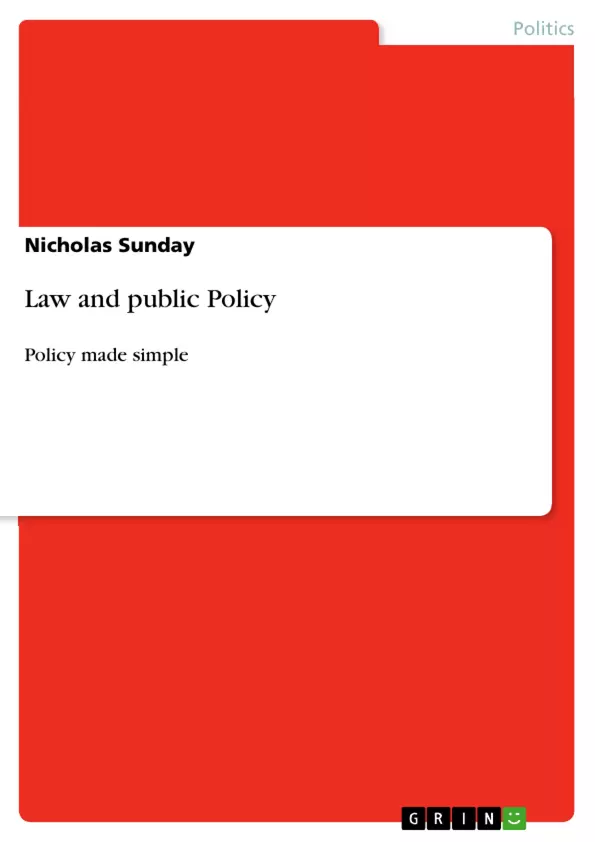Legal divisions and the laws have a significant impact on the creation of public policy. Discover the relationship between law and public policy and even vital knowledge available to public policy practitioners gain a solid background in legal concepts, cases, and current trends that will give you a head that if you decide to pursue a law degree, if you encounter legal questions in your work plan.
Table of Contents
- UNIT 1 PUBLIC POLICY: THEORETICAL PERSPECTIVES
- Introduction
- Meaning of Policy
- Nature of Public Policy
- Policy Making and Decision Making
- Scope of Public Policy
- Why Study Public Policy
Objectives and Key Themes
This book aims to bridge the gap between traditional academic approaches to the study of government and relate these approaches to the outputs of government, namely, public policies. It provides a substantive examination of policy processes, including policy-making, implementation, and evaluation.
- The theoretical perspectives of public policy.
- The nature and scope of public policy.
- The relationship between policy-making and decision-making.
- The importance of studying public policy in developing countries.
- The role of government in shaping public policy.
Chapter Summaries
UNIT 1 PUBLIC POLICY: THEORETICAL PERSPECTIVES: This unit explores the theoretical underpinnings of public policy. It begins by defining public policy, examining its various meanings and interpretations offered by different scholars. The unit delves into the nature of public policy, highlighting its diverse forms and characteristics, such as its purpose, scope, and relationship to government actions. It then examines the intricate connection between policy-making and decision-making, differentiating between the two and emphasizing the role of public officials in shaping policy outcomes. Furthermore, the unit analyzes the expanding scope of public policy in modern society, illustrated by the numerous areas of life impacted by government interventions. Finally, it underscores the crucial importance of studying public policy, particularly in developing countries striving for socio-economic progress and national development, explaining how understanding policy can facilitate the transition from past practices to future goals.
Keywords
Public policy, policy analysis, policy-making, decision-making, government, national development, socio-economic development, developing countries, theoretical perspectives, policy implementation, policy evaluation.
FAQ: Comprehensive Language Preview - Public Policy: Theoretical Perspectives
What is the purpose of this book?
This book aims to connect traditional academic understandings of government with the practical outputs of government: public policies. It offers a thorough examination of policy processes, encompassing policy-making, implementation, and evaluation.
What topics are covered in Unit 1: Public Policy: Theoretical Perspectives?
Unit 1 explores the foundational theories of public policy. It defines public policy, examines its various interpretations, and details its nature, forms, and characteristics. It analyzes the relationship between policy-making and decision-making, the expanding scope of public policy in modern society, and the importance of studying public policy, especially in developing countries.
What are the key themes of the book?
Key themes include the theoretical perspectives of public policy, its nature and scope, the link between policy-making and decision-making, the significance of studying public policy in developing countries, and the role of government in shaping public policy.
What are the main objectives of the book?
The book aims to bridge the gap between academic theory and practical government outputs (public policies) and provide a substantial examination of the entire policy process, from creation to evaluation.
What is included in the Table of Contents?
The table of contents includes a detailed outline of Unit 1: Public Policy: Theoretical Perspectives, covering an introduction, the meaning and nature of public policy, policy making and decision making, the scope of public policy, and the reasons for studying public policy.
What keywords are associated with this book?
Keywords include public policy, policy analysis, policy-making, decision-making, government, national development, socio-economic development, developing countries, theoretical perspectives, policy implementation, and policy evaluation.
What are the chapter summaries included in this preview?
The preview includes a summary of Unit 1, detailing its exploration of the theoretical foundations of public policy, including definitions, interpretations, nature, characteristics, the relationship between policy-making and decision-making, the expanding scope of public policy, and the importance of studying public policy, particularly in developing countries.
- Citar trabajo
- Professor Nicholas Sunday (Autor), 2013, Law and public Policy, Múnich, GRIN Verlag, https://www.grin.com/document/209299



